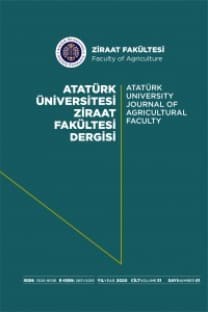Domates ve biber bakteriyel leke hastalığı ile biyolojik savaşta actigard ve bazı antagonistlerin etkinliği
Xanthomonas campestris pv. vesicatoria patojeninin sebep olduğu bakteriyel leke hastalığı dünya biber ve domates üretiminde, meyve verimi ve kalitesinde önemli ekonomik kayıplara sebep olan en önemli hastalıklardan biridir. Mevcut mücadele yöntemleri ile de bu hastalık kontrol altına alınamamaktadır. Bu çalışma ile, bakteriyel leke hastalığının kontrolü için Burkholderia sp. (BA-7). Pseudomonas sp. (BA-8) ve Bacillus sp. (BA-140) gibi üç farklı antagonistik biyokontrol organizma ve bitki aktivatörü (Actigard) kullanılarak, alternatif bir biyokontrol metodunun geliştirilmesi amaçlanmıştır. İn-vitro koşullarda bu biyokontrol bakterilerin patojen bakteri X. c. pv. vesicatoria (strain Xcv-l I0c)'ya karşı antagonistik etki gösterdikleri gözlenmiştir. Sera koşullarında, Actigard ve üç biyokontrol organizma ile muamele edilen biber ve domates bitkilerinde pozitif kontrole göre hastalık şiddetinde önemli düşüş olduğu gözlenmiştir. Fitotoksite test sonuçları, Actigard'ın 35 g/L önerilen dozunun, biber ve domatesin büyümesinde önemli bir gerilemeye sebep olduğunu gösterirken, kullanılan biyokontrol organizmaların hiçbirisi fitotoksik etki göstermemiştir.
Effects of actigard and some antagonists in biological control of bacterial spot disease on tomato and pepper
Bacterial spot caused by Xanthomonas campestris pv. vesicatoria is one of the most important diseases on pepper and tomato production in the world. The pathogen, causes serious economic loses in fruit yield and quality- Control of this disease by using commercial disease management methods is extremely difficult. This study was performed to develop on alternative and effective control method for the bacterial spot diseases of pepper and tomato by using plant activator (actigard) and three different antagogonistik biocontrol agents (Burkholderiasp. (BA-7), Pseudomonas sp. (BA-8) and Bac/7/ussp. (BA-140), respectively. All of the biocontrol agents used in this study were observed with antagonistic effect against a pathogenic strain of X. C. pv. vesicatoria (strain Xcv-11 Oc) in-vitro conditions. Under greenhouse conditions, the disease severity data showed that both pepper and tomato plants treated with'actigard or any of the three biocontrol organisms have significantly reduced disease severity than control plants. On the other hand, phytotoxicity test results suggested that actigard treatment of the recommended concentration 35 g/L caused significant growth reduction in both pepper and tomato plants. However, no phytotoxicity effect was observed on pepper or tomato plants treated with any of biocontrol agents tested.
___
- ISSN: 1300-9036
- Yayın Aralığı: Yılda 3 Sayı
- Yayıncı: AVES Yayıncılık
Sayıdaki Diğer Makaleler
Effects of two different environmental conditions on the fattening performance of Brown Swiss bulls
Naci TÜZEMEN, Leyla TURGUT, Mete YANAR
M. Figen DÖNMEZ, Sally MİLLER, Fikret ŞAHİN, Erkol DEMİRCİ
Karadeniz Bölgesinde fındık depolama yapılarının planlama kriterlerinin belirlenmesi
Mustafa OKUROĞLU, İbrahim ÖRÜNG
Recep KOTAN, Sally A. MİLLER, Fikrettin ŞAHİN, Erkol DEMİRCİ
İvesi, Morkaraman ve Tuj kuzularında büyüme eğrileri
Muhlis MACİT, Mevlüt KARAOĞLU, Ömer Cevdet BİLGİN, Nurinisa ESENBUĞA
Erzurum piyasasında tüketime sunulan mutfak tipi tereyağlarının mikrobiyolojik özellikleri
